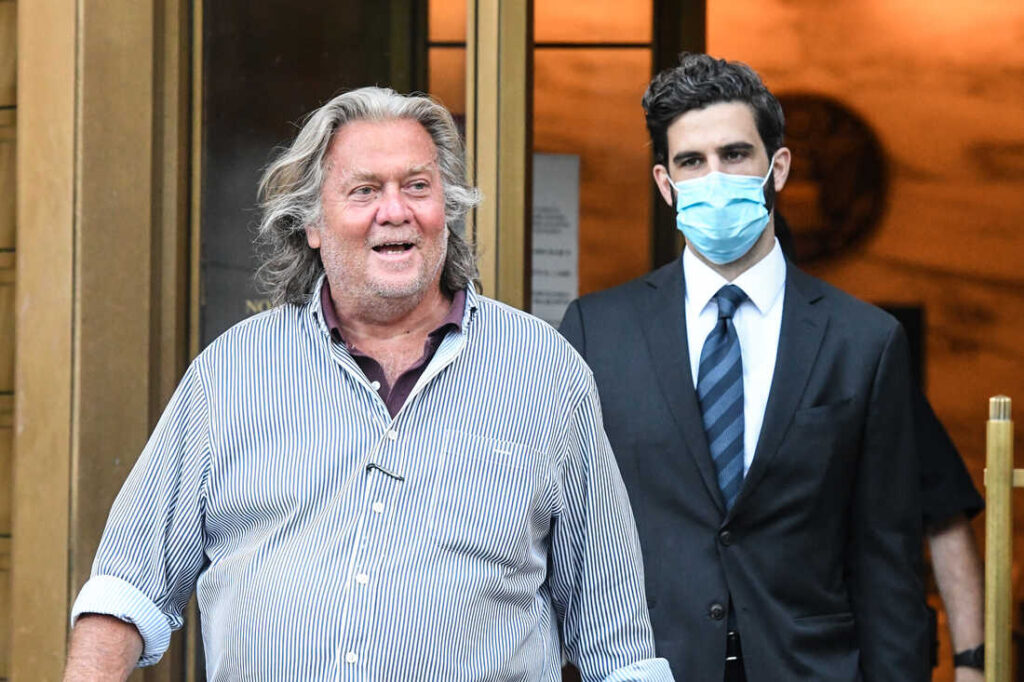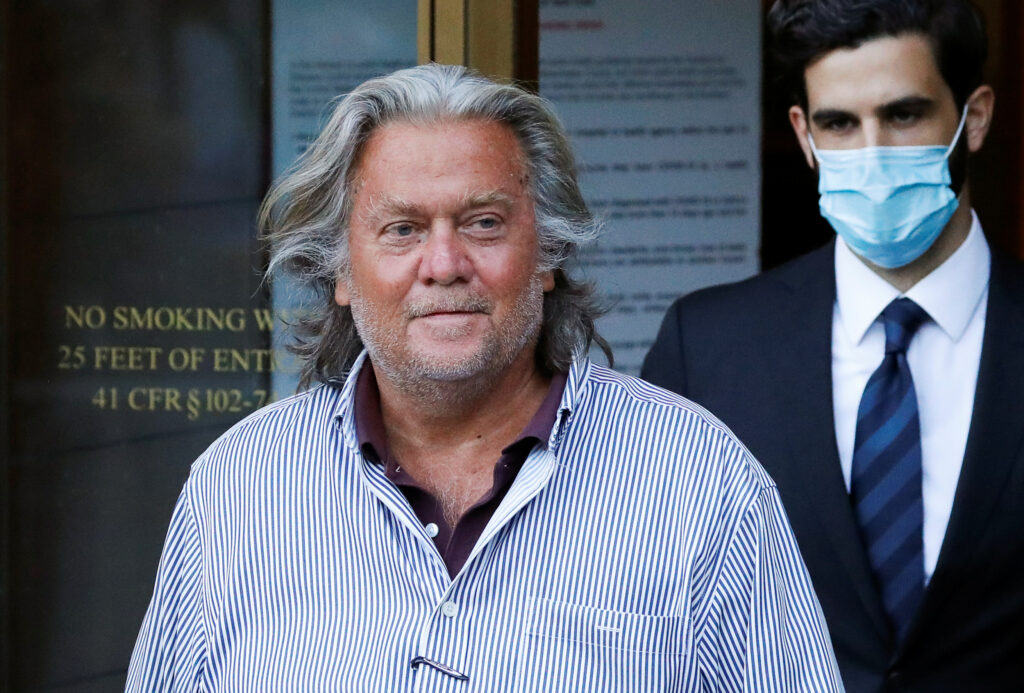In a stunning turn of events, former White House strategist Steve Bannon finds himself facing charges of fraud alongside three others. The allegations stem from a crowdfunding campaign, aptly named “We The People Will Fund The Wall,” which aimed to raise a staggering $1 billion to finance the construction of a border wall between the United States and Mexico.
The campaign quickly gained traction, capturing the attention of both the public and the media, as donations flooded in, reaching an astounding $17 million within just a week. However, doubts began to overshadow the initiative’s legitimacy, leading to its suspension by the crowdfunding platform, GoFundMe. Concerns arose that the funds raised may not be directed toward the intended purpose, prompting Bannon and his associates to establish a nonprofit organization called We Build the Wall Inc. Unfortunately, their efforts to address those concerns have now come under the scrutiny of the Department of Justice, as they allege that the campaign’s operators channeled substantial sums of money towards their own pockets rather than the wall construction. This has resulted in each of the accused individuals facing charges of conspiracy to commit wire fraud and conspiracy to commit money laundering.
Bannon’s involvement in this controversial venture sparks intrigue and invites us to delve deeper into the story behind his $25 million border wall campaign. Let us examine the details surrounding this shocking turn of events and uncover the true extent of this GoFundMe gone bad.

Former White House strategist Steve Bannon and three others charged with fraud
Former White House strategist Steve Bannon, along with three others, has been charged with fraud in connection with a crowdfunding campaign aimed at building a border wall between the United States and Mexico. The campaign, called “We The People Will Fund The Wall,” sought to raise $1 billion in order to support the construction of the wall. However, suspicions were raised about the legitimacy of the campaign, prompting further investigation.
Background of the crowdfunding campaign
The crowdfunding campaign “We The People Will Fund The Wall” garnered significant attention when it was launched. The idea behind the campaign was to rely on the collective contributions of concerned citizens in order to finance the construction of a border wall. The campaign quickly gained momentum and received widespread media coverage. Within just one week, the campaign managed to raise an astonishing $17 million in donations.
Suspicion raised about the campaign
Despite the initial success of the crowdfunding campaign, doubts began to emerge surrounding its legitimacy and the management of the funds. GoFundMe, the platform hosting the campaign, suspended it in December due to concerns that the money raised might not be used directly for the intended purpose of building the border wall. This suspension led to increased scrutiny and further investigation into the activities of the campaign operators.
Establishment of We Build the Wall Inc.
In response to the growing concerns, Steve Bannon, along with others involved in the campaign, formed a nonprofit organization called We Build the Wall Inc. The creation of this organization was an attempt to address the issues raised and provide transparency regarding the utilization of the funds. However, the Department of Justice alleges that the operators of the campaign, including Bannon, instead funneled hundreds of thousands of dollars to themselves, rather than using the funds for the construction of the wall.

The crowdfunding campaign: ‘We The People Will Fund The Wall’
The objective of the “We The People Will Fund The Wall” campaign was to rally public support and raise funds from concerned citizens to finance the construction of a border wall. The campaign aimed to collect a staggering $1 billion in donations. However, concerns about the legitimacy of the campaign arose due to the significant amount of money involved and the lack of transparency in its operations.
Amount of funds raised
In just one week, the campaign managed to raise an impressive $17 million in donations. This considerable sum attracted media attention and highlighted the public’s interest in the border wall issue. However, questions were raised about the campaign’s ability to reach its ambitious $1 billion target and its capacity to manage such a large pool of funds.
Media attention
The success of the crowdfunding campaign did not go unnoticed by the media. The efforts to engage the public in funding the construction of a border wall attracted national attention and sparked debate about the issue. While the media coverage initially focused on the unprecedented amount of funds raised, it later shifted to scrutinizing the legitimacy and transparency of the campaign.
Concerns about the campaign’s legitimacy
GoFundMe, the platform hosting the “We The People Will Fund The Wall” campaign, suspended it in December amid concerns about the use of the raised funds. The platform expressed doubt that the donated money would be directly allocated to the construction of the border wall as promised. This suspension led to a halt in further donations and drew attention to the potential discrepancies and misuse of the funds.

GoFundMe’s suspension
The decision by GoFundMe to suspend the campaign signaled an alarm that something was amiss. The platform, known for its commitment to ensuring the accuracy and transparency of crowdfunding campaigns, took the step to temporarily halt the fundraising efforts due to concerns about the management and allocation of the funds raised. GoFundMe’s intervention raised further doubts about the legitimacy of the campaign.
Doubts about money usage
In addition to GoFundMe’s suspension, doubts emerged regarding how the funds raised through the campaign were being utilized. Concerns were raised about the lack of clarity surrounding the financial transactions and whether the money was being channeled properly towards the construction of the border wall. These doubts further eroded public trust in the campaign’s operators and their ability to fulfill their promise.
Formation of We Build the Wall Inc.
In response to the suspension of the crowdfunding campaign and the growing concerns about the management of funds, Steve Bannon and others involved in the campaign created We Build the Wall Inc., a nonprofit organization. The intent behind forming this organization was to address the doubts and alleviate concerns by providing a platform for better oversight and transparency in the utilization of funds.
Creation of nonprofit organization
The establishment of We Build the Wall Inc. aimed to demonstrate a renewed commitment to ensuring the funds raised were used appropriately for the construction of the border wall. By creating a nonprofit organization, the campaign operators sought to enhance accountability and transparency in their financial operations. However, the subsequent allegations of fraud raise questions about the true intent behind the establishment of this organization.

Efforts to address concerns
We Build the Wall Inc. made efforts to reassure the public and address concerns about the campaign’s legitimacy. The organization promised that all funds would be used exclusively for the construction of the border wall and emphasized its commitment to transparency. However, these efforts were overshadowed by the subsequent legal accusations and charges brought against the campaign operators.
Allegations and charges against the campaign operators
The Department of Justice has charged Steve Bannon and three others involved in the crowdfunding campaign with fraud. The charges include conspiracy to commit wire fraud and conspiracy to commit money laundering. These allegations suggest that the operators of the campaign knowingly deceived donors and misappropriated funds for personal gain, rather than directing them towards the intended purpose of building the border wall.
Overview of the charges
Each of the accused individuals faces one count of conspiracy to commit wire fraud and one count of conspiracy to commit money laundering. These charges carry significant legal implications and potential consequences for the individuals involved. The allegations highlight the systemic fraud that unfolded behind the scenes of the crowdfunding campaign and raise concerns about the integrity of similar campaigns in the future.
Conspiracy to commit wire fraud
The accusation of conspiracy to commit wire fraud suggests that the campaign operators intentionally used electronic communication, such as emails or phone calls, to deceive donors and obtain funds under false pretenses. This charge implies a deliberate and coordinated effort to defraud the public and misrepresent the true intentions behind the campaign.

Conspiracy to commit money laundering
The charge of conspiracy to commit money laundering implies that the individuals involved in the campaign engaged in financial transactions with the intent to disguise the true source and nature of the funds. This charge suggests that the campaign operators attempted to conceal their improper use of the donations by moving money through various channels, thereby masking its origins and ultimate destination.
Legal consequences for the accused
If found guilty, the accused individuals face severe legal consequences for their alleged involvement in the fraud. The charges of conspiracy to commit wire fraud and conspiracy to commit money laundering carry significant penalties, including substantial fines and potentially lengthy prison sentences. The legal process will determine the ultimate outcome for the individuals involved, and their actions may serve as a cautionary tale for others involved in similar campaigns.
Impact on future crowdfunding campaigns
The allegations and charges brought against the operators of the “We The People Will Fund The Wall” campaign have profound implications for the future of crowdfunding campaigns. The fraud case has sparked concerns about the authenticity and transparency of such initiatives, potentially undermining public trust in these platforms. It may lead to increased scrutiny and stricter regulations to ensure the integrity of future crowdfunding campaigns.
Response from the public
The fraud charges leveled against Steve Bannon and others involved in the campaign have elicited varied responses from the public. While some express outrage and disappointment at the alleged deception, others view the charges as a reflection of broader issues within the political and fundraising landscape. The case has served as a reminder of the need for greater accountability and transparency in public campaigns, particularly those that involve significant financial contributions from the public.
Damage to trust in crowdfunding platforms
The revelations and legal proceedings surrounding the “We The People Will Fund The Wall” campaign have dealt a blow to public trust in crowdfunding platforms. The suspension of the campaign by GoFundMe and the subsequent allegations of fraud have highlighted the vulnerabilities and risks inherent in such platforms. It may take time for this trust to be rebuilt and for donors to feel confident in contributing to future campaigns on these platforms.
Examination of the border wall funding issue
The fraud charges against Bannon and others have also reignited the debate surrounding border wall funding. The case has served as a reminder of the contentious nature of this issue and the challenges associated with financing such projects. It has prompted discussions about alternative approaches to border security and raised questions about the effectiveness and necessity of a physical barrier.
Debate surrounding border wall funding
The issue of funding a border wall has long been a topic of debate among policymakers and the public. The fraud case involving the “We The People Will Fund The Wall” campaign has added fuel to this ongoing debate, with critics of the project citing it as an example of the pitfalls and potential corruption associated with securing funds for the construction of a wall. Supporters, on the other hand, may view the allegations as isolated incidents that should not undermine the importance of border security.
Alternative approaches to border security
The revelations surrounding the fraud case have prompted discussions about alternative approaches to border security. Critics argue that investing in technological advancements, increased personnel, and improved immigration processes may be more effective and cost-efficient than constructing a physical barrier. This case serves as an opportunity to reevaluate the strategies and policies surrounding border security in order to achieve the desired outcomes while safeguarding against fraud and misuse of funds.
Case study: Bannon, the $25M Border Wall Campaign, and GoFundMe
The fraud case involving Steve Bannon, the $25M Border Wall Campaign, and GoFundMe serves as a notable case study with important lessons to be learned. The timeline of events leading up to the fraud charges offers insights into the vulnerabilities of crowdfunding campaigns and the potential consequences of mismanagement and dishonesty.
Timeline of events
The timeline of events surrounding the “We The People Will Fund The Wall” campaign showcases the rapid rise and subsequent fall of the fundraising efforts. Within just one week, the campaign managed to raise an impressive $17 million in donations. However, suspicions about the campaign’s legitimacy soon led to GoFundMe suspending the fundraising efforts. Subsequent investigations unveiled allegations of wire fraud and money laundering, resulting in legal charges against the campaign operators.
Lessons learned from the case
The case involving Steve Bannon and the $25M Border Wall campaign offers several important lessons for future crowdfunding campaigns. It highlights the need for transparency, accountability, and clear communication with donors to maintain public trust. Platforms like GoFundMe must have robust systems in place to verify the legitimacy of campaigns and ensure the funds are used as intended. Additionally, donors should exercise caution and conduct thorough research before contributing to any crowdfunding effort.
Conclusion
The fraudulent activities alleged against the operators of the “We The People Will Fund The Wall” campaign have raised significant concerns about the integrity of crowdfunding campaigns and the management of funds. The case involving Steve Bannon and others underscores the importance of transparency and accountability in public fundraising initiatives. While the legal consequences for those involved remain to be determined, this case serves as a cautionary tale for future campaigns and highlights the need for stricter regulations and oversight in the crowdfunding industry. The impact of this case on public trust in crowdfunding platforms and the broader debate surrounding border wall funding will be felt for years to come. It is essential to learn from this case and ensure that crowdfunding campaigns uphold the values of transparency, integrity, and responsible financial management.





